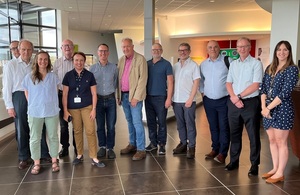CoRWM visits the Underground Research Laboratory at Bure, France
In June, members of CoRWM visited the Underground Research Laboratory at Bure in France which is run by the French National Radioactive Waste Agency (ANDRA).

On 20 June 2023, 6 members of CoRWM visited the Underground Research Laboratory (URL)at Bure in France, run by the French National Radioactive Waste Agency (ANDRA). In the morning the visit covered:
1. Presentations from ANDRA, NWS (Nuclear Waste Services from the UK) and CoRWM.
2. ANDRA – the French radioactive waste policy in general and how it relates to Bure.
3. The role of the French regulators and planning authorities in ensuring public and environmental safety.
4. The specific challenges of future radioactive waste disposal in the proposed ‘CIGEO’ geological disposal facility (GDF).
5. The usefulness of an underground rock laboratory.
6. ANDRA’s approach to community engagement and consultation.
Thanks in particular to our French hosts and their colleagues Paola Vilarino, Dominique Mer; Olivier Lareynie (on MS Teams); Corinne Bauer (on MS Teams); Sarah Dewonck, Gilles Armand and Dominique Mer.
In the afternoon, CoRWM members were accompanied 490 metres below ground to see at first hand the construction, management, and various research activities involved in the Bure URL.
Key issues that members focussed on during and after the visit included:
1. The benefits or restrictions to the value of a URL facility that is separate from the eventual proposed GDF. The contribution of research studies both in terms of the performance of the host rock as part of a multi-barrier containment approach, and in response to different engineering construction techniques.
2. The NWS position vis a vis a URL including the relevance of transfer of applicable knowledge from other URLs (such as at Bure) to NWS’s proposed approach for the UK.
3. The French approach to “reversibility” (otherwise referred to as waste retrievability) and how that relates to CoRWM’s existing position on the topic. Both the French policy exposition on retrievability, and ANDRA’s research into proposed solutions to managing the effect of corrosion of cannisters should retrieval be required.
4. The French approach to construction of the CIGEO facility – including construction techniques; access via funicular railway, and a period of pilot operation without emplacement.
5. The French approach to licencing their CIGEO facility – relations with the regulator and the iterative nature of licence submissions.
6. Local community relations, in particular the distribution of benefits to the local communities and how inward investment decisions involve cross-industry support, not simply the role of ANDRA.
7. The significance of being able to demonstrate to third parties the practicalities, challenges and safety aspects of geological disposal through such site visits.